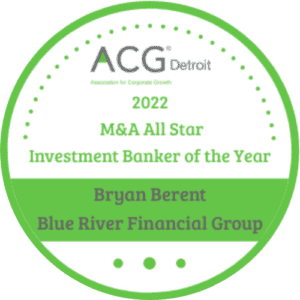The M&A market today is not what it was last year. We are seeing more certainty, dynamic growth across various industries, and record M&A activity. Blue River’s Managing Partners, Bryan Berent and William Loftis share valuable insight about the M&A market today in the interview below.
Q. What is different about the M&A market now versus the same time last year?
A. Bryan Berent (BB): Last year, in August, companies were just starting to emerge from poor performance during the pandemic, but it was still slow. Now, it’s a very frothy market. Most private equity firms are focused on adjusting their portfolio and are back in a big way after having lost a year in investment. Similarly, strategic buyers were holding off and were focused more on the supply chains and how to manage through the issues they had. They are now mostly back in the M&A market.
Another thing that’s changed in a big way is the lending environment. The same time last year lenders were focused on their own portfolio, and weren’t looking to commit their money on speculative M&A transactions. Now that has shifted, and most lenders are looking to significantly increase M&A related lending.
William (Bill) Loftis (BL): In 2020, private equity, corporations, and other institutional investors were holding a lot of money. They wanted to acquire privately owned companies, but they couldn’t even get to the business locations to perform due diligence. We had an LOI on a Canadian company when the Canadian government shut down the border. Our US buyer was not able to get into Canada to inspect the sites.
In 2020 we also saw aberrations to financial statements in private companies. Some companies performed amazingly well, while others went absolutely down. The uncertainty made it difficult for buyers to have confidence in valuations. Buyers buy the future, not the past, so they were trying to understand what the seller’s real performance would be once the pandemic passed. In 2021 we have a better sense of what’s real, although significant uncertainty remains.
Q. What caused the market to surge in 2021?
A. BB: There is more certainty in the market now. Many companies have much stronger cashflows than they did last year, and their monthly run rates are back to pre-pandemic levels. Business owners now feel they can achieve valuations at pre-pandemic levels. Another thing that has caused the market surge is the Biden administration’s tax increases. The tax implications of waiting might be pretty severe.
Q. Which industries have thrived through the pandemic?
A. BL: We are seeing new records almost every day on the stock markets as prices of publicly traded stocks keep going up. The entire economy seems to be moving upward. The same thing is happening in private markets. Industries that were deemed essential during the pandemic are doing quite well. For example, logistics, healthcare, building products, manufacturing all seem to attract multiple buyers. Industries that suffered during the pandemic, like hospitality, are slowly beginning to show monthly revenues at pre-pandemic levels, and buyers are coming back to those industries too. Industries that are healing slowly from the pandemic’s effects are still seeing depressed sale prices. The point is that there are many institutional buyers looking to deploy capital, so the demand for quality private businesses has never been stronger. When lots of money are chasing a small supply of privately held businesses, prices escalate.
BB: We are seeing significant activity in the engineering and industrial automation space. We have a number of clients in the industrial automation space focused on bringing back manufacturing to the Unites States. Industrial automation companies that have emerged from the pandemic now use M&A to grab more market share.
Q. In what ways does M&A help companies achieve growth?
A. BB: It is extremely competitive for businesses in mature industries. It’s quite difficult to achieve growth organically, and it also takes time. In the current environment, there is a need to achieve growth faster, and that’s where M&A comes in. Going back 15-20 years, most private companies never even thought of M&A as a growth strategy. Now, it seems, everyone does. It’s a way to invest capital and get returns in a hurry. Some companies achieve substantial growth and reach a tier where they can be more competitive with companies that are already at that tier, in a much quicker timeframe than going through organic growth.
BL: The classic company growth question is: “Should we build it or buy it?” Buying can be faster than the more plodding organic growth. However, unprepared buyers can set their organizations backward with a bad acquisition. Companies that opportunistically respond to acquisitions, rarely generate outstanding outcomes. For example, if a competitor approaches offering to sell, and the buyer has little or no experience in M&A; the buyer would be foolish to move forward without a seasoned M&A advisory team consisting of an attorney, CPA, and/or investment banker with significant valuation experience.
On the other hand, when companies embrace acquisitions as a key company strategy, they build essential competencies around valuations, negotiations, post-closing assimilations, and more. They create disciplined expectations (a.k.a., investment theses) and actively pursue companies that satisfy their criteria. They recognize suitable targets when they see them, because they look at companies all the time. Companies that are good at M&A know what they are after, like new markets, new products, new intellectual property, new marketing channels, new talent, expanded production capabilities. Wrong acquisitions can set private companies backward, but those who develop core competencies in acquisitions become larger, better, and more valuable businesses when they do it well.
Q. What should businesses look for in an M&A advisor?
A. BL: When privately held middle market businesses are to be placed for sale, they should consider M&A advisors/investment bankers as ”market makers.” The private capital marketplace is not like other markets. For example, if a person owns stock in a publicly traded company, they can go to their stockbroker and sell it quickly on the exchange where it is listed. If a person wants to sell baseball cards, there is a standing market for that. There are markets to sell used cars, real estate, precious metals etc.
But private company owners have a much different problem. The information relating to their businesses is highly confidential. Owners don’t want employees, customers, competitors, or anyone else to know the business is for sale. So, how does one go about finding multiple qualified buyers willing to compete to acquire the business when no one is even allowed to know it is for sale? What companies need is an experienced investment banker highly skilled in creating a “confidential market” among professional investors who can be trusted to maintain confidentiality. The private capital marketplace consists of capital providers that invest in private companies for a living, like private equity firms, family offices, small business investment corporations, private corporations, public corporations, SPACs, and others. Owners should look for M&A advisors who understand and have the respect of participants in the private capital marketplace, because that’s where the buyers of middle market businesses come from. Blue River is such a market maker in the private capital market place.
BB: One of the things you want is an advisor that has the ability to assemble a list of all of the appropriate buyers to reach out to. You need that firm to have good research capability to create a market, because without that you don’t know who has been active in a specific industry. You also want someone who understands and can help you understand how buyers think. If you don’t understand how buyers think, it’s hard to understand the value you can possibly achieve. You also need an advisor who is willing to be truthful, who will tell it like it is, who will tell you if your thinking is wrong. An advisor won’t have all the answers, but they should be able to provide you with guidance. If you go in with wrong assumptions and wrong beliefs, it’s never going to be a transaction that you’ll be happy with.
BL: Owners of privately held companies have only one chance to get it right. If they sell for the wrong price or to the wrong group, the errors are permanent and unrecoverable. There is no way to go back and fix mistakes after the transaction is done. You need someone with enough knowledge to provide true guidance and prevent you from stepping into some of those traps. Owners need to understand about transaction options, buyer types, valuations, commercially reasonable terms, transaction taxes, timing, and the entire spectrum of transaction opportunities. Beyond the investment banking firm, owners need someone who will work well with their attorney, CPA, and other advisors, along with the buyer’s advisors. M&A is a highly specialized area. Owners should have a sense that their advisor has been there and done that before. On the biggest transaction of an owner’s life, taking a chance on an unproven investment banker is probably not wise.
Bryan Berent is Managing Partner and co-founder of Blue River. Berent brings over 20 years of expertise to small to mid-size business clients. He has deep experience in analyzing the financial, operational and investment components of businesses. He holds an MBA, with honors, in Corporate Finance and Corporate Strategy from the University of Michigan and a B.A. in Accounting and Statistics also from the University of Michigan. Bryan’s full bio is available here.
William “Bill” Loftis is Managing Partner and co-founder of Blue River. Mr. Loftis developed a passion for M&A as a transaction principal, and has assisted buy and sell-side clients through the M&A process in multiple industries. He earned a B.A. in Business Administration from Alma College and a Master of Science in Finance from Colorado State University. Bill’s full bio is available here.
About Blue River
Blue River Financial Group is a middle market merger and acquisition advisory firm headquartered in Bloomfield Hills, Michigan. It assists corporations, private equity groups and individuals in the sale and acquisition of businesses, and has completed assignments in multiple business segments. With over 19 years of experience spanning across 50 global industries, Blue River provides a suite of services to middle market clients including corporate development, private equity support, valuations and transaction consulting, placing a premium on relationship-centered transaction counsel and client focus.








